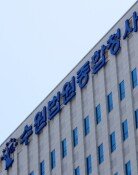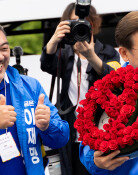[Editorial] Two Lobbying Scandals Put Prosecution to Test
[Editorial] Two Lobbying Scandals Put Prosecution to Test
Posted September. 20, 2007 07:51,
The Busan District Prosecutors Office requested an arrest warrant for former presidential protocol secretary Jeong Yun-jae on September 19, and made it clear that the investigation into the influence-peddling scandal would be further expanded, saying, Bringing in an indictment against the former aide does not necessarily mean the end of the probe. With the prosecutions decision to continue its investigation, suspicions arose that a high-profile figure other than Jeong may have involved in the decision to suspend a tax audit against Kim Sang-jin, a Busan construction company owner, rather than Jeong Sang-gon, then commissioner of the Busan Regional Tax Office.
Jeon Gun-pyo, commissioner of the National Tex Service (NTS), allegedly requested the prosecution to cease the investigation on the use of 100 million won the bribe offered to the former Busan tax chief by Kim. The government agency denied that allegation, saying, We just expressed our hope that the probe would end soon because it negatively affected the trust and morale of the organization. However, the news report came from a reliable source, namely internal reports by prosecutors.
It has also been reported that a senior officer of the agency asked him to reserve what he has to say in order to protect the organization, when he visited Jeong in the detention house roughly ten days before his first trial. It is obvious that the NTS was trying to muzzle Jeong who was then seemingly determined to get to the bottom of the case in the court. It is hard to believe that the tax audit, which had been carried out for two months, was interrupted by the head of the regional tax office without reporting it to the headquarters.
On the other hand, the prosecution is concerned with the discontinuation of their investigation concerning the Shin Jeong-ah scandal, after a local court rejected its request to issue an arrest warrant for the former professor/curator. It even released a public statement criticizing the court for turning down its warrant request, which was an unprecedented measure for the prosecution. The courts decision would be a setback for the prosecution which intended to perform an independent probe into the case. However, the courts rejection cannot foil the prosecutions efforts to find out the truth. The prosecutors office can lodge an appeal for the warrant after making up for any weak points if a new suspicious criminal charge is found.
Its investigation should be focused on whether Shin and Byeon have exploited tax payers money for personal profit. The controversy cannot be resolved without clearing suspicion over a high-ranking figure behind the scenes.
With regard to the two influence-peddling scandals, the prosecutions willingness and its capability in the investigation have been put to the test. The agency itself would be well aware of what should be done to bring out the truth.







